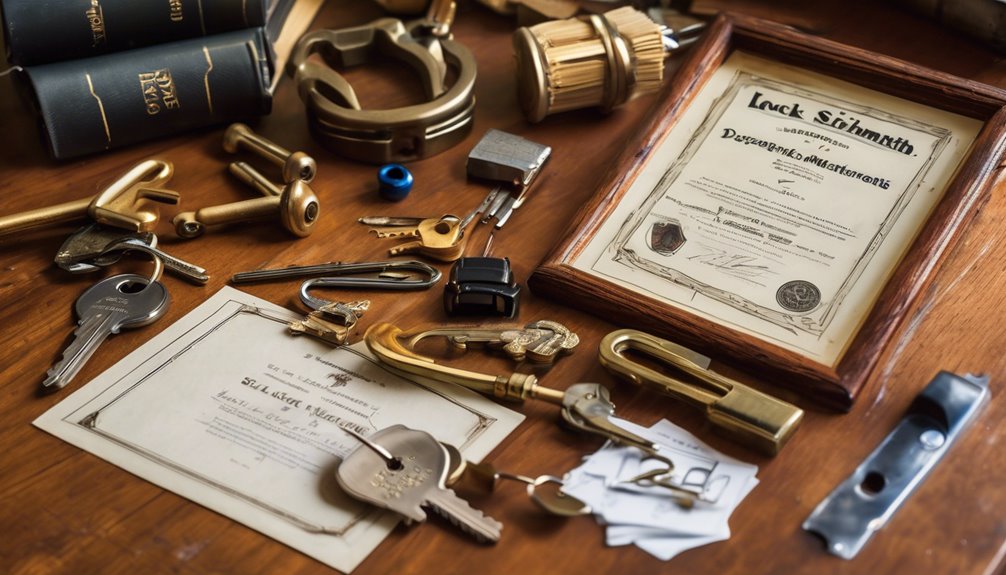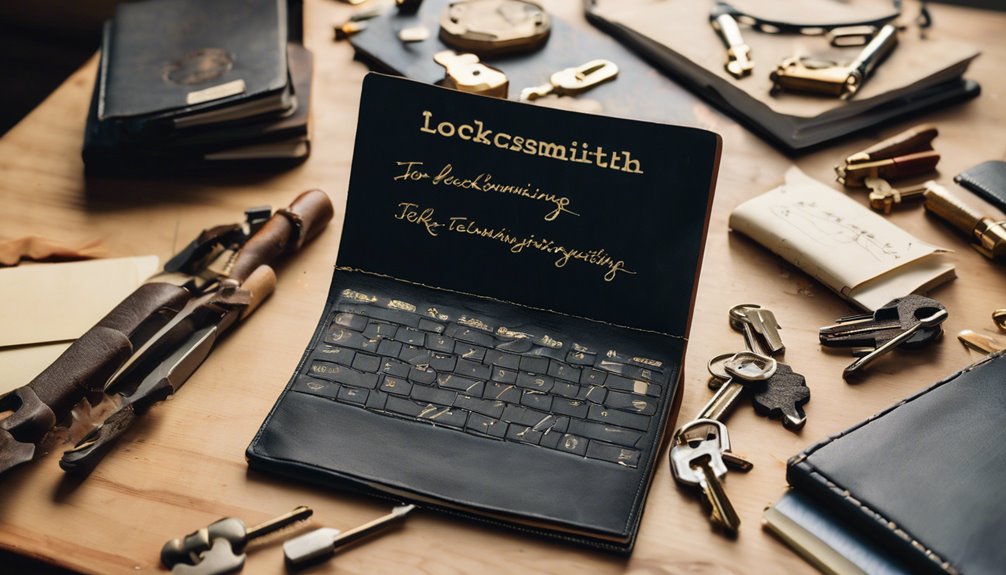As you stand at the threshold of a new career, the locksmithing profession in Illinois is like an intricate lock waiting for the right key—a key that you’re poised to forge with your own hands. You’re not just looking at picking up a set of tools; you’re considering a venture into a world where your skills could ensure security and peace of mind for countless individuals.
To start turning the tumblers on this journey, you’ll need to understand the specifics of licensing requirements, which include more than just a knack for mechanics and a steady hand. Training and apprenticeships will offer you the foundational knowledge and practical experience you need, and when it’s time to take the licensure examination, you’ll want to be as prepared as any master locksmith.
Key Takeaways
- To become a locksmith in Illinois, you must meet certain requirements such as being at least 18 years old, having good moral character, passing a licensing exam, and undergoing a criminal background check.
- Finding a locksmith school in Illinois can be done by checking local directories, online directories, or considering apprenticeship under an experienced locksmith.
- Licensing requirements for locksmiths in Illinois include passing a qualifying examination and obtaining a valid license, which is required in cities like Chicago, Aurora, Joliet, etc.
- To obtain a locksmith license in Illinois, you need to apply with IDFPR, pass the qualifying examination, submit fingerprints for a background check, and obtain general liability insurance.
Becoming a locksmith in Illinois involves maneuvering through specific licensing requirements and completing ne
Understanding the Licensing Requirements for Locksmiths in Illinois

If you’re considering a career as a locksmith in Illinois, it’s crucial to understand the licensing requirements that you must meet.
To obtain an individual locksmith license, you need to be at least 18 years old and complete a 20-hour training course. The Illinois Department of Financial and Professional Regulation mandates a criminal background check to guarantee good moral character.
To become a licensed locksmith in Illinois, you must be 18 and complete a 20-hour training course, along with a background check.
After that, you’ll need to pass the locksmith exam and obtain insurance coverage of at least $1,000,000.
While individual locksmiths can operate without an agency license if they’ve no employees, compliance with the Private Detective, Private Alarm, Private Security, and Locksmith Act of 2004 is still necessary.
Educational Pathways: Finding Locksmith Training in Illinois
When you’re ready to pursue a locksmith career in Illinois, exploring your educational options is crucial. You can find locksmith training programs at various community colleges and vocational schools that offer certificate and diploma courses, providing you with foundational skills in the locksmith trade.
Alternatively, consider apprenticeships under experienced locksmiths, allowing you to gain hands-on experience while learning the craft. If local options are limited, expand your search to nearby states or look into online locksmith training courses.
Additionally, resources for locating these programs can be found in local phone directories or online. Don’t forget to check out the Illinois Locksmith Licensing Study Package from the Associated Locksmiths of America, which includes essential study materials to prepare for your licensing exam.
Steps to Obtain Your Locksmith License

After completing your training, it’s time to focus on obtaining your locksmith license in Illinois. First, confirm you’re at least 18 years old and ready to pass a criminal background check. Next, you’ll need to complete an approved 20-hour training and pass the proficiency exam administered by the Illinois Department of Financial and Professional Regulation. Once you pass, obtain liability insurance coverage of $1,000,000.
Here’s a quick overview of the steps:
| Step | Requirement | Notes |
|---|---|---|
| Age Requirement | Must be at least 18 years old | |
| Training | Complete an approved 20-hour training | |
| Insurance | Obtain liability insurance of $1,000,000 | |
| Application Submission | Submit application with fees and proof of training | No P.O. Boxes accepted |
Confirm all your documents are in order to secure your locksmith licenses!
Preparing for the Locksmith Examination
Preparing for the locksmith examination requires a solid foundation of knowledge and practical skills, so it’s crucial to utilize the right resources.
Start by completing the Illinois Locksmith Licensing Study Package (Code No.: A-ILL-LLSP4), as it’s a requirement before taking the exam. This examination covers 300 questions on locksmithing principles, safety codes, and practical skills like key origination and master keying.
To enhance your study, check out the resources available for purchase on the Associated Locksmiths of America website.
Remember, you’ll also need to pass a proficiency examination and provide proof of good moral character through a criminal background check to meet the requirements for locksmiths in Illinois.
Prepare well, and you’ll be on your way to success!
Essential Study Materials for Aspiring Locksmiths

Aspiring locksmiths in Illinois benefit greatly from utilizing a variety of essential study materials to prepare for their licensing examination. The Illinois Locksmith Licensing Study Package (Code No.: A-ILL-LLSP4) is significant, including texts like “Locksmithing 101,” the “Basic Electricity Study Guide,” and the “Life Safety Code Manual.”
Additionally, the Associated Locksmiths of America offers valuable resources for exam preparation, ensuring you grasp locksmithing principles thoroughly. It’s important to complete these study materials, as understanding safety codes is fundamental for passing the proficiency exam.
Don’t forget that practical components may be part of the exam, so hands-on training is important. Consider enrolling in local vocational schools or community colleges for structured courses to enhance your learning experience.
The Future of Locksmith Licensing in Illinois
As Illinois moves toward potential deregulation of locksmith licensing by 2029, you’ll want to understand how this could impact your future in the industry.
Without strong licensing standards, maintaining professionalism and consumer trust becomes even more critical.
Staying informed and advocating for necessary standards will help protect both your career and the public.
Potential Deregulation Impact
While the impending repeal of Illinois locksmith licensing requirements by January 1, 2029, poses a significant shift in the industry, it also raises concerns about consumer safety and service quality.
The Regulatory Sunset Act aims to reduce job barriers, but this may lead to a surge of unqualified “trunk slammers” operating without proper oversight. Without licensing, there’s less accountability for locksmith companies, which could compromise your security.
You might find it increasingly challenging to guarantee a criminal background check is performed on prospective locksmiths. As a consumer, you’ll need to be proactive in verifying credentials and seeking licensed locksmiths to protect yourself.
It’s vital to advocate for standards to maintain safety and reliability in this unregulated environment.
Advocacy for Standards
Given the upcoming repeal of locksmith licensing requirements in Illinois, it’s essential for both industry professionals and consumers to advocate for standards that guarantee safety and reliability. Without proper regulations, unqualified individuals could enter the field, jeopardizing consumer protection.
| Key Concerns | Importance |
|---|---|
| Advocacy for Standards | Guarantees safety for consumers |
| Licensed Locksmiths | Builds trust in the profession |
| Illinois General Assembly | Key in shaping future regulations |
| Professional Regulation | Protects against fraud |
Locksmiths must monitor legislative developments closely and participate in community discussions to uphold professional standards. Engaging in advocacy for standards will help maintain the integrity of the profession and guarantee the safety of consumers in Illinois.
Resources for Ongoing Education and Professional Development

To succeed as a locksmith in Illinois, you’ll want to engage in ongoing education and professional development.
Consider enrolling in certificate or diploma courses at community colleges or vocational schools to build essential skills. Apprenticeships under experienced locksmiths provide invaluable hands-on training that complements your formal education.
The Illinois Locksmith Licensing Study Package from the Associated Locksmiths of America (ALOA) offers resources to help you prepare for proficiency exams.
Participate in workshops and seminars through organizations like the Society of Professional Locksmiths to enhance your skills and network with other professionals.
Finally, stay informed about legislative updates and industry standards, especially with potential deregulation looming by 2029, to guarantee you adapt and thrive in this evolving field.
Frequently Asked Questions
Does Illinois Require a Locksmith License?
Yes, Illinois does require a locksmith license for anyone wanting to operate legally.
You need to be at least 18 years old, show good moral character, and pass a criminal background check.
Once you meet those criteria, you’ll also need to pass a proficiency exam and obtain insurance coverage of $1,000,000.
It’s crucial to comply with the relevant regulations to guarantee you’re legally allowed to provide locksmith services in Illinois.
How Long Does It Take to Become a Locksmith in Illinois?
It might feel like a quick journey, but becoming a locksmith in Illinois takes several months.
You’ll start with a 20-hour training course, which could stretch from weeks to months. After that, you’ll need to pass a proficiency exam, and that’s where preparation really comes into play.
Don’t forget the criminal background check, which can add more time. Once you’ve completed everything, expect an additional 2-4 weeks for processing your license.
Do I Need to Be Licensed to Be a Locksmith?
Yes, you need a valid locksmith license to operate legally.
You’ll have to be at least 18 years old and pass a criminal background check. Demonstrating good moral character is essential too.
Once you’ve completed a proficiency exam and secured insurance coverage of $1,000,000, you can obtain your license.
Even if you’re working solo without employees, you still need that individual locksmith license to stay compliant.
Is It Worth Training to Be a Locksmith?
Training to be a locksmith is like crafting a key that opens various opportunities. It’s absolutely worth it!
You’ll gain essential skills, hands-on experience, and valuable connections in the industry. With a solid salary potential and a projected job growth of 7%, you’re setting yourself up for a secure future.
Plus, early training positions you ahead of the curve before any regulatory changes increase competition. Embrace the chance to open new doors!








